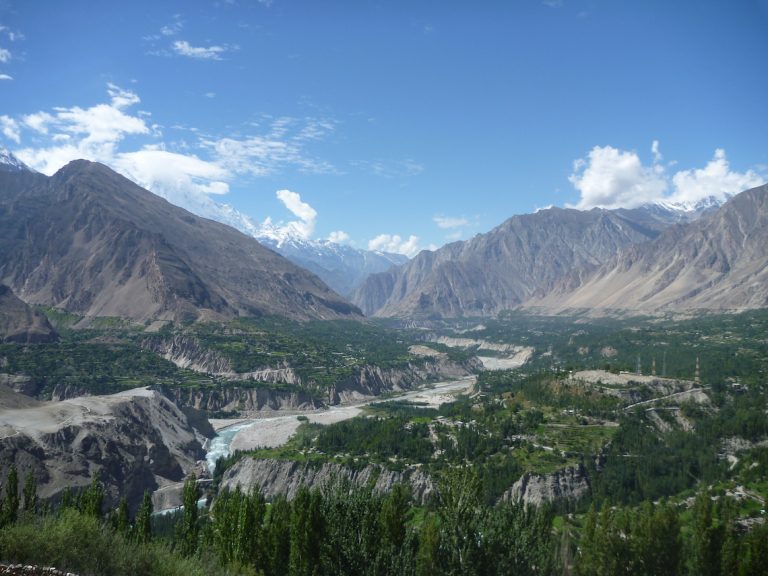Fern Hume rides with balls of brass along Pakistan’s infamous mountain highway
Every cloud has a silver lining. I come from a family of bikers, and had maps of the world on my bedroom walls rather than pop stars; a sure sign of things to come. A horrid car accident was a blessing in disguise. The compensation payout allowed me to quit my job and hit the road on my bike in search of something different. My dad lent me Lois Pryce’s two books about her trans-continental adventures. This gave me the courage to go alone… and the seed was sewn.
I’d had the lucky break financially, recovered from my injuries and so it began. My start was Ely, East Anglia, and my destination was New Zealand. What would happen between A and B, who knew? My trip planning began in earnest a year before departure. What dawned on me whilst gazing at the map of the world was that between A and B were some countries with a fearsome reputation. But having heard stories of fantastic adventures and hospitality, I was up for the challenge.
Hearing about the killing of nine western tourists in Northern Pakistan this June made me shudder. It is one of those countries that once you visit it, it captures your heart. After years of indoctrination by the western media, Pakistan… the place of terrorism, war… etc.
I know this is not the case, but once there it makes it all the more real. Kidnapping and terror related incidents make the local community suffer. I wonder what the repercussions are for the people I drank tea with, the girls I shared my crisps with…
Leaving Europe, things got progressively eastern. A day’s ride from Greece, the last EU country, I was in Istanbul and experiencing the spice bazaar and call to prayer from the minarets. Into Eastern Turkey I first encountered more stares than normal, and felt aware of how I was dressing. Then came Iran, where it is compulsory for women to cover up, this is not just wearing a headscarf, but covering your wrists, neck, bum, and technically, make-up and nail varnish are forbidden. This seemed daunting, and inconvenient; try taking a helmet off and whipping on a headscarf in one fell swoop! Riding through the deserts with the extra clothing was also hot work.
I meandered along the silk road, through Turkmenistan, Uzbekistan, Tajikistan, and finally met with eleven other riders on the border of Kyrgyzstan and China at the ruins of a caravanserai (site of an ancient silk road market and not far from the Pamir Highway on page 68). We slept in a yurt kept warm by yak dung. The next morning we headed into China for a five day guided crossing, then down the Karakoram highway (KKH).
After staying with herders in Kyrgyzstan, heading into the modern quick fix high-rise cities of China was surreal. Once we ditched our unhelpful guide in Turkmenabat, we climbed into the Tien Sien- Celestial Mountains. I’ve seen the Alps but there is something about being on massive plains, riding past wide glaciers that disappear into the clouds. The Chinese guard screamed and snatched for my passport. Despite umpteen border crossings since leaving Europe into Turkey, I’d had enough of this authoritative rudeness in China.
Anticipation of crossing into Pakistan came in several forms: whether my little carburetted bike could cope with the long climb up the Kunjerab Pass (4,693 metres) to such an altitude, or being a western woman in a Muslim country, or terrorism, the state of the road, the excitement? I was told many a time that the road ahead was the most spectacular road in the world. My stomach was churning, and not just from the horrific bout of food poisoning in Kashgar, China two days before. Thank goodness for flip up helmets when coping with projectile vomit!
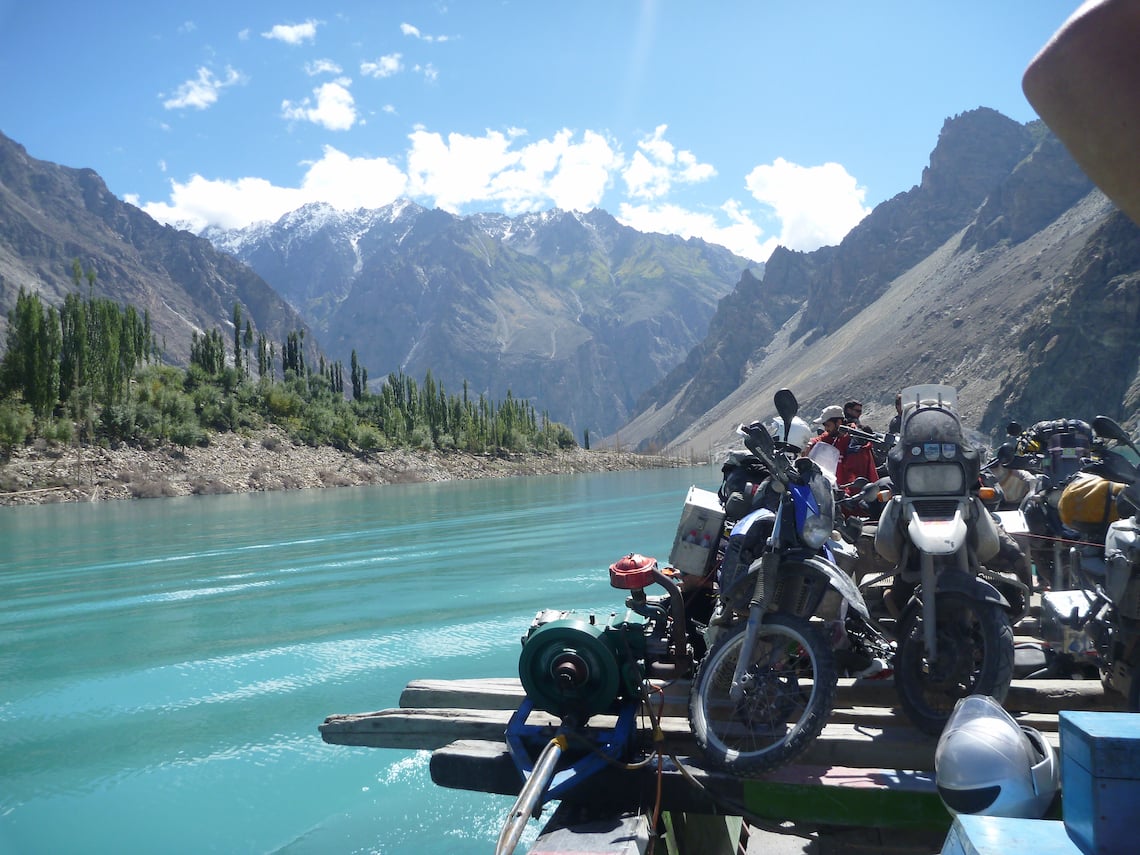
We hit 4,850 metres above sea level at the border; here it was, the highest international paved road in the world. Riding up so quickly made me sick. Putting a leg down to steady the bike I felt as drunk as a skunk and as sick as a dog. Our Pakistani border guard, a Colonel Gaddafi lookalike, greeted us with open arms, a huge contrast to the Chinese guards. And there was me wondering whether I should don my headscarf, tucked into my tankbag for rapid deployment. Nevertheless, the guard was quite friendly in a touchy feely way, posing for group photos.
The immaculately smooth Chinese highway ended as soon as we passed the first Pakistani check point, and within 500 metres we were riding through rocky river crossings. The highway vanished. The gorge ahead looked like something out of Lord of the Rings. I was expecting Golum to jump out on me at any point. The KKH lived up to its reputation. One moment there would be billiard table smooth tarmac, with free flowing bends, finally getting up into 5th gear, and the next, it had disappeared into a landslide, with bulldozers ripping through the mountains, and deep rocks and gravel to ride through.
Seeing the men working on the road reminded me of the huge loss of life taken to build this road. Reading the monument at the top of the pass made me appreciate the sacrifices taken back in the 1960s; one worker dying for nearly every kilometre of road. Rocks were falling as we rode through. There we are, geared up to the nines with the latest Toura-watsit kit, having great Kodak moments riding through rivers and hammering over boulders, and here comes Mr Local Chap, on a 125cc motorbike, in his pristine white robes and business briefcase in his hand, takes his flip flops off, and gracefully tackles the river, not a bead of sweat shed. Put me to shame!
We rolled into Sost, and, reminiscent of my time in Iran, I noticed women were not very visible on the street. But this is a border town, so that was to be expected. The beautiful hand painted Bedford trucks reminded me of ride reports from India. The second day we rode down into the Hunza valley. Nestled amongst the 7,000m peaks, were colourful villages, white rapids, glacial melt waters, goat herders and tin roofs covered in drying apricots. I rode though villages seeing kids and women going about their business. I was surprised; women were not hidden and covered up to the extent I was expecting due somewhat to the Ismali sect of Islam being prominent here. They wore beautiful colours and were not shy.
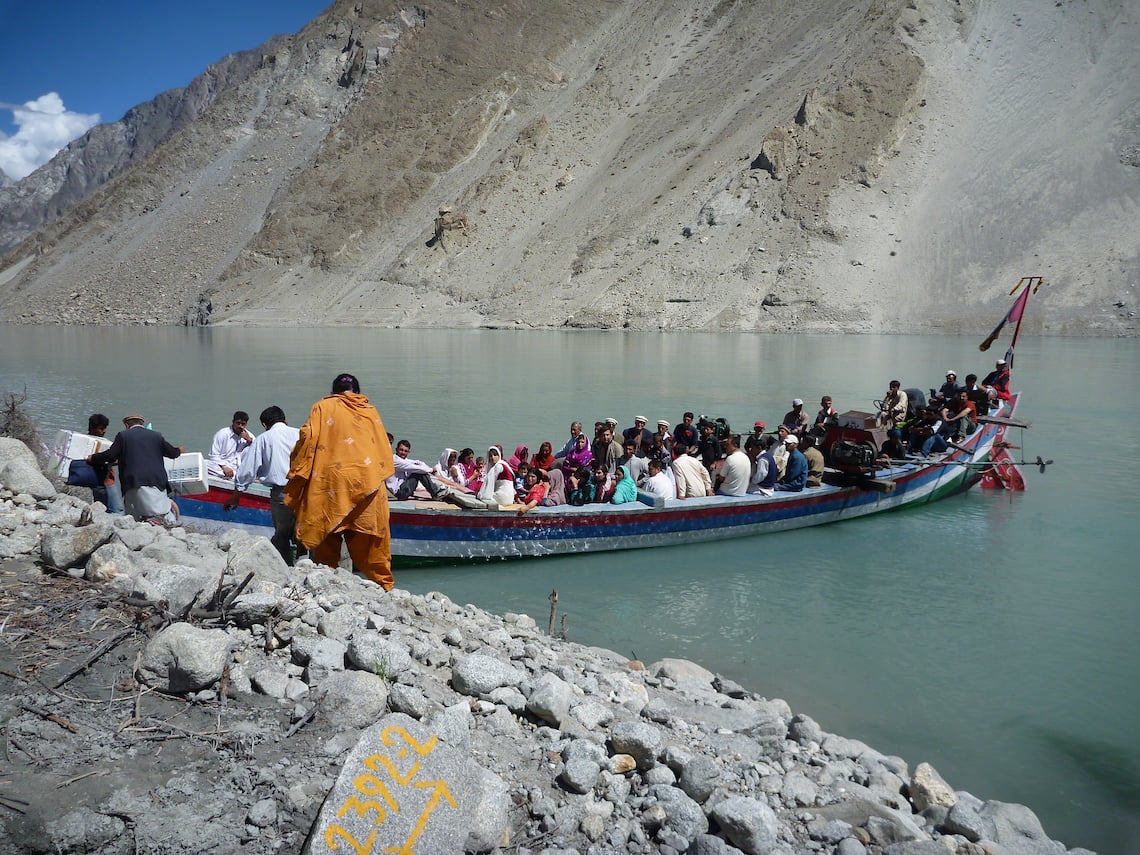
The dreaded lake was ahead. A landslide blocked the river and caused a raging torrent, wiping out whole villages in minutes back in 2010. This blocked most international trade between Pakistan and China, economically devastating. We wondered if a boat could take all of our bikes in one go. There were no wharfs or jetties, our pride and joys were dragged down the soil embankment and rolled on planks into the wooden boat. Just metres away we could see the wreck of a sunken boat. A helpful young chap negotiated passage for us on a relative’s vessel. All eleven bikes loaded precariously on beams straddling the boat. Luckily my bike was the smallest and lightest. I felt for the men hauling the huge BMWs aboard! Sailing down the lake, I had never in my life seen such magnificent vistas- 4,000m high cliffs surrounded by 7,000m peaks, and a deep turquoise lake. My jaw literally ached.
A night was spent with the group in Karimabad. We enjoyed epic mountain views and a sneaky beer, a treat in a dry country. The next morning we split and I headed into Gilgit so I could get my visa extended. Gilgit is the main hub for the area. The town was in lock-down. Just two weeks before, a bus of 25 Shia pilgrims was stopped at a fake police checkpoint and shot dead. A few days before my arrival, a murder had taken place after Friday prayers in the town. The checkpoints became frequent, and huge rocket propelled grenade launchers, armoured vehicles and mounted machine gun sentries featured at all big junctions. This shit just got real. However, enough of the scary stuff, riding out of the town, and past the enormous Nanga Parbat (the 9th highest mountain in the world at 8,126 metres!) I met a gaggle of school girls, so intrigued by seeing a woman on a motorcycle. We sat and babbled to each other, not understanding a word, but shared a packet of crisps, alas I had no sweeties on me. I hope they go on to think that nothing is beyond the realms of imagination as they grow up into young women.
For some strange reason the London embassy only gave me a seven day visa, not long enough to travel through Pakistan, therefore I needed an extension. I was lucky to get a visa at all, some over-landers have not succeeded with Pakistani visas. I was told extending in Islamabad was a pain, and I didn’t want to risk travelling further down the KKH with an expired visa, in an area that my government is not happy with me being in. The Gilgit passport office refused me three times, after which, with some intervention from a guest house owner and the head of the ISI secret service, all things were ‘smoothed over’ and the magic stamp was now in my passport. I did my usual trick of checking into the grottiest guesthouse listed in Lonely Planet, and riding over to the five-star hotel to use the free wifi in more salubrious surroundings. Criminal, I know.
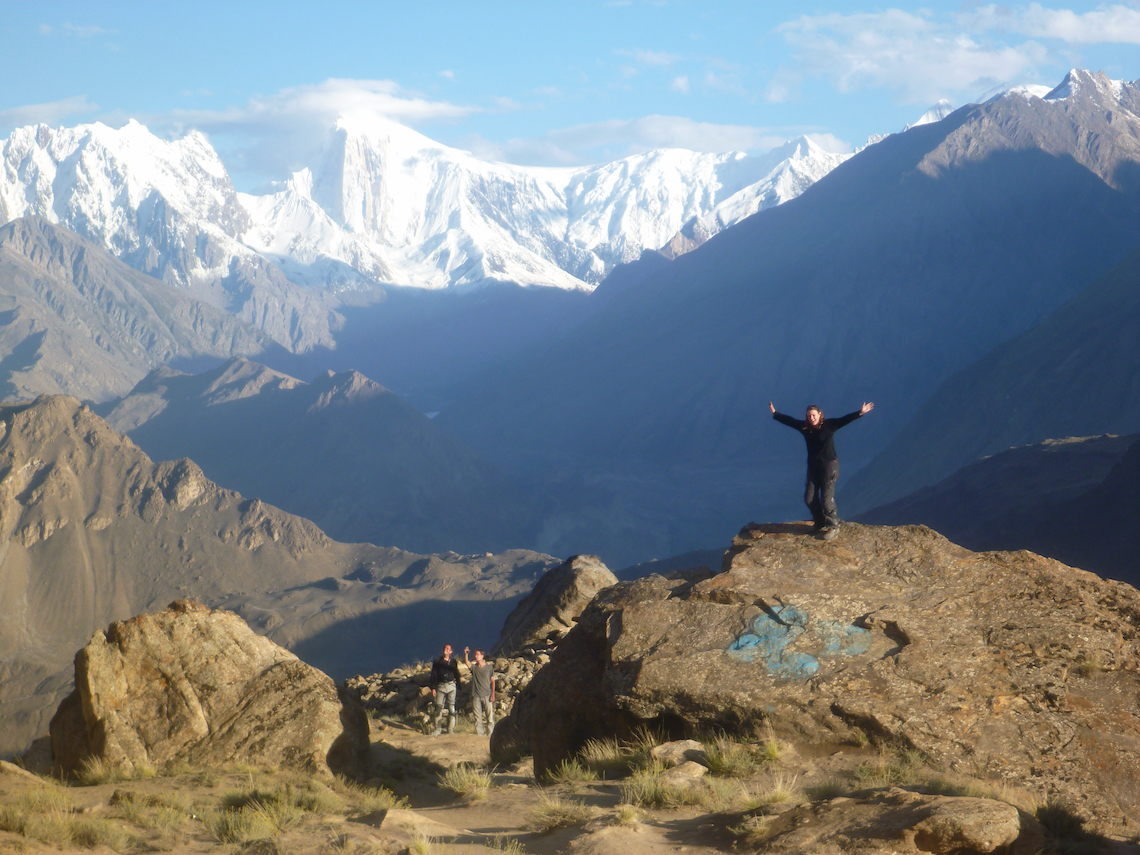
I caught up with the other bikers and headed into Skardu, the nearest town to the K2 basecamp. The intention was to bypass some of the KKH and head up and over the Deosai plains. It is the second highest plateau in the world, at an average elevation of 4,114 metres; Deosai means ‘the land of Giants’. Unfortunately, on the steep climb up the stony track, my bike wouldn’t play ball and the clutch was slipping so much I risked burning it out. With a heavy heart I turned back, I didn’t want to hold the group back, and risk having a broken down bike in one of the remotest places in the world. This also meant riding the rest of the KKH without the safety of numbers.
Riding into Chilas was strange. Like my night in Gilgit, I was advised not to venture out of the guesthouse at night. Whether this was for my safety, because I was a women and my dignity needed preserving, or because they wanted my business in their kitchen, who knows.
I met up with a couple of cyclists from Belgium and had a wonderful meal in what seemed like a biblical travellers inn, by oil lamp in a power-cut. I wanted to travel on the Babusar Pass the next day, however a gang had ambushed several vehicles the day before and therefore caused tourists to be banned from crossing over.
Checkpoints between each town meant that it was difficult to get to places that one shouldn’t be in. Most of the time I had to ride with an escort. No arrangement, just rock up at the barrier, sign your passport details into their ledger (most often writing comedy names). The escort would sometimes be cadets in berets with guns, riding on a tiny motorbike, at a snail’s pace, or a pick up truck with RPGs. I was invited into the checkpoint compounds for tea on many occasion, which is all very well and good, and so hospitable, but after the sixth occasion in the day and with the sun setting on a treacherous road, I couldn’t always say yes.
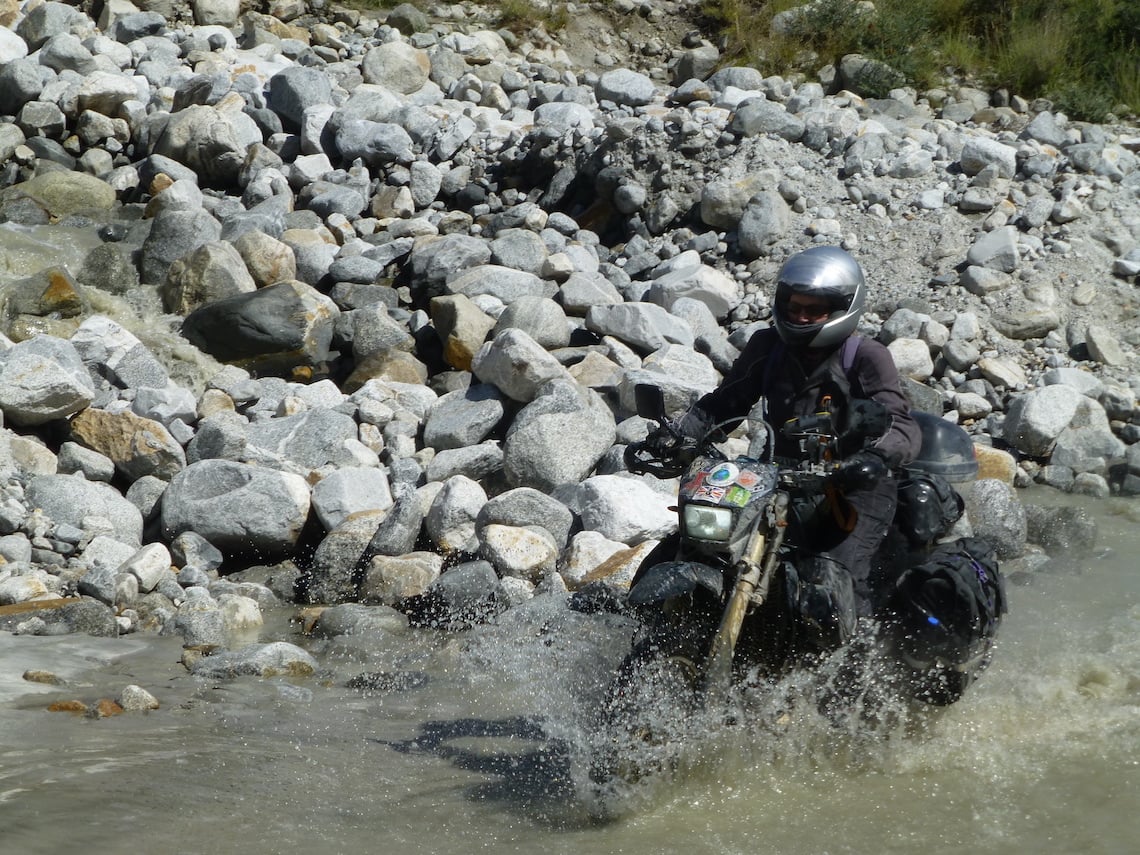
I was enjoying the friendliness, but as I rode behind the last police pickup escort, we were spat at and stones were thrown. I doubt very much this was because of me; perhaps there was some local dispute with the police. Anyways, I had an issue with the last checkpoint in the town of Besham, demanding a letter of ‘no objection’ from the authorities giving me permission to be there. This was not a requirement when I first planned the journey! I explained that they would also encounter another 12 bikers coming down also without this magic letter. Well, I was there now and what were they to do with me?
I had to stay at the designated tourist hotel, ran by the Pakistan Tourism Development Corporation, which were usually good value places to stay. Not on this occasion. They wanted $40!
When I saw the rows of UN and other NGO landcruisers lined up outside I quickly realised why they charged and got away with charging such a premium (think about this when you next donate to a large multinational charity). Thankfully I was allowed to camp in the garden of the motel for a smaller fee. Of course it poured with rain all night. The local army guarded me at all times. My tent was checked for pesky terrorists. Once I studied the map for my next day of travel, I realised that Besham is on the junction into the Swat Valley, a stronghold of the Taliban, hence the insistence to stay in the Government compound.
The next morning riding south towards Abbatabad (of Bin Laden fame), it dawned on me that I was leaving the majesty of the mighty mountains and entering the temperate climate for the first time, where banana plants grew by the side of the road. I’d never seen one before. They kept distracting me from the sheer cliffs off the side of the road! Time to concentrate…
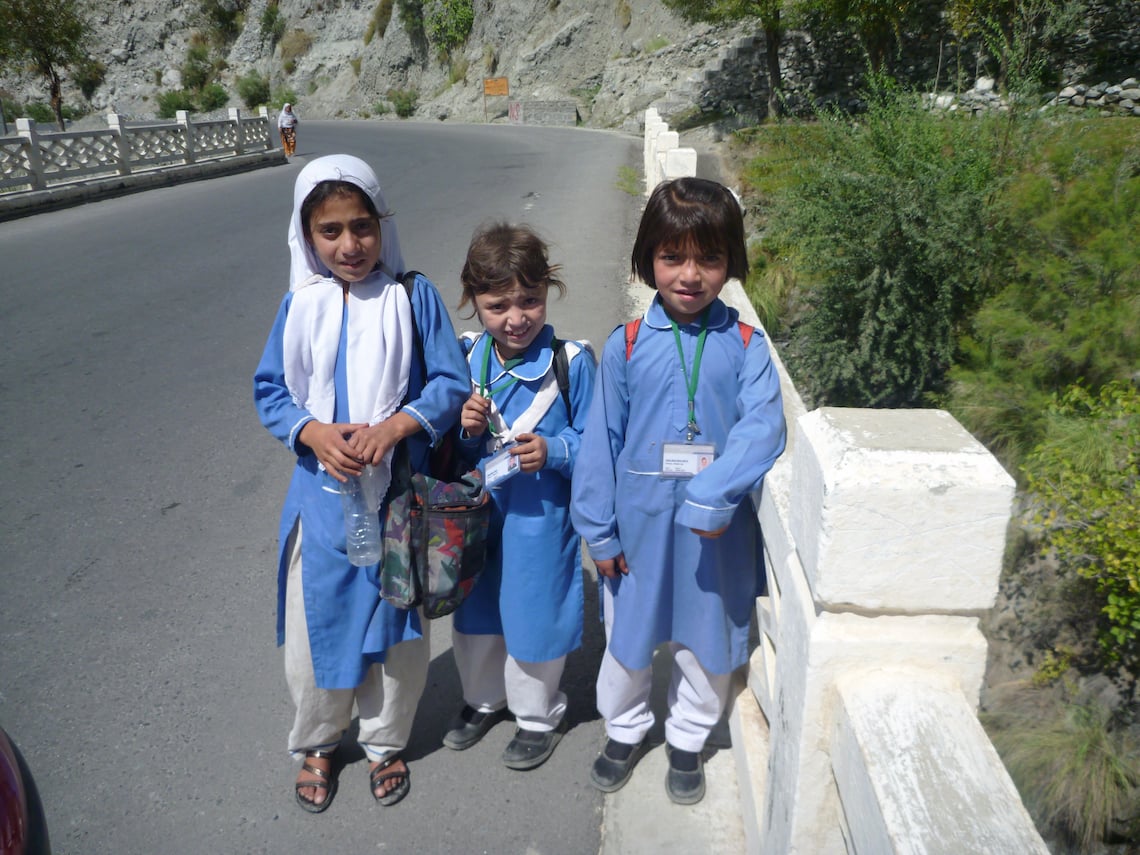
Riding into Islamabad I hit the start of the monsoon. At the embassy in the city, my next task was to get an Indian visa. Going to the embassy made me realise the realities of the long and bitter division of the neighbouring countries, both nuclear powers and at war with each other. A fabulous woman journalist I met at the embassy accommodated me in the foothills, away from Islamabad whilst the protest against some daft American cartoon took place. I learnt so much about Pakistani politics and culture in my week of rest as I waited for my Indian visa to process.
The last day in Pakistan was spent riding down the Grand Trunk Road to Lahore, and then on into India. I had been reading about the partition of the two countries in 1947 and as I rode down the straight two laned highway (such a contrast from the mountains), I visualised hundreds of thousands of poor souls on the move during that time, and the horrific crimes committed. These thoughts stayed with me over the border.
I was sad to leave Pakistan, and like many countries I wanted to stay longer, but Pakistan will always have a special place in my heart. I was surprised at the amount of tourist lodges, ancient ruins and adventure sports on offer in Northern Pakistan, and I hope both for the economic benefit of the locals, and for the thrill of tourists that tourism can flourish once again. Many people spoke to me of the hardships since the tap of tourists ran dry after 9/11. Even after living in Nepal in the eastern Himalayas, Northern Pakistan offers a different kind of majesty and welcome that has to be experienced in the flesh to be believed. See you there someday.
THE BIKE
The bike’s a DRZ400, 2005 model. I wanted a DRZ400S, plenty of SMs for sale, but it’s difficult to find 17-inch tyres in weird countries. I bought an ‘SM’ and changed the wheels for 18/21 inch wheels. Pros: Simplicity rules; single cylinder, carbed, much lighter than other adv bike at 140kg. It is light enough to pick up. I kitted it up with soft luggage. Cons: the aluminium rear subframe is not the strongest. Seat is like having a permanent wedgie, rescued by an airhawk and sheepskin. A larger front tank and another stash of fuel takes me to 20-litres, which I found to be ample.
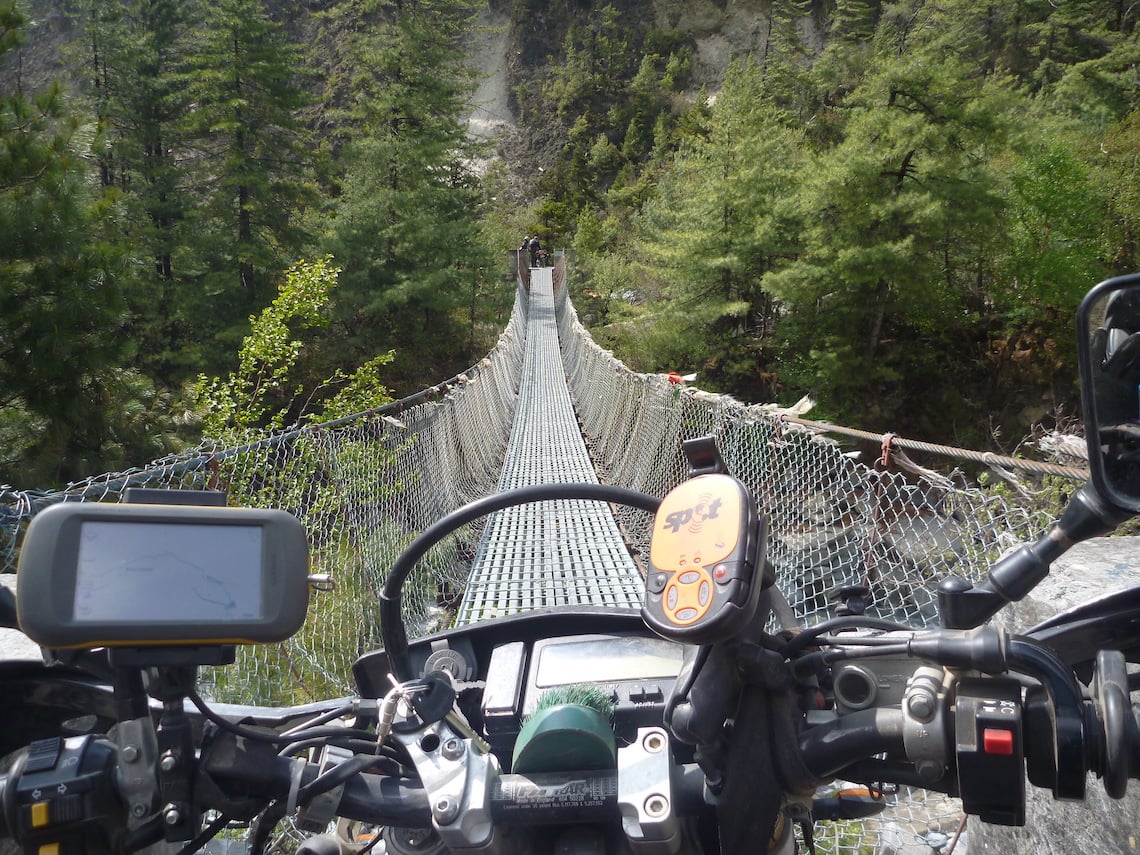
WANT TO DO THIS?
Travel advice
The Foreign and Commonwealth Office (FCO) advise against all travel to the Federally Administered Tribal Areas. The districts of Charsadda, Kohat, Tank, Bannu, Lakki, Dera Ismail Khan, Swat, Buner and Lower Dir in Khyber-Pakhtunkhwa. The city of Peshwar, northern and western Balochistan. And travel on the Karakoram Highway between Islamabad and Gilgit (where Fern went). And then all but essential travel to other parts such as Quetta, with high threat from terrorism, kidnap and sectarian violence. The advice is to contact local authorities in advance to check the local security situation. They may arrange police protection. Following the attack on June 22nd 2013 at the Nanga Parbat base camp in which nine foreign tourists were targeted and killed there has been a tightening of the security situation. One of the best places to keep track of things is on the Horizons Unlimited community forum, with regular updates from people on the ground.
Is it safe?
The biggest risk on all foreign motorcycle trips is the traffic itself, and the roads in Pakistan are probably better/calmer than in India. As to greater personal risks, you take your chances, but incidents are very few and far between. Exercise caution and travel with care, though in truth, rightly or wrongly, an element of danger is part of the appeal of a place such as this.
Health
The advice is to contact your GP around eight weeks before your trip to check whether you need any vaccinations. Diptheria, hepatitis A, tetanus and yellow fever are all likely to be needed for trips of less than a month.
Dress
Dress modestly at all times. Men and women should cover their shoulders and legs when in public. Women should cover their heads when entering mosques or other holy places, and when travelling in rural areas. Importing alcohol and pork products is illegal. Homosexuality and co-habitation by an unmarried couple is also illegal.
Insurance
Most standard travel policies exclude claims if you visit a country or region to which the FCO advises against all or ‘all but essential’ travel. Some will only exclude claims relating to the perceived threat (if you fall off your bike, you’re fine. If you get shot by a terrorist, you’re not). But most will exclude all claims for any reason.
Specialist brokers such as Campbell Irvine can help. Or speak to the ever helpful Richard at Navigator Insurance; www.navigatortravel.co.uk
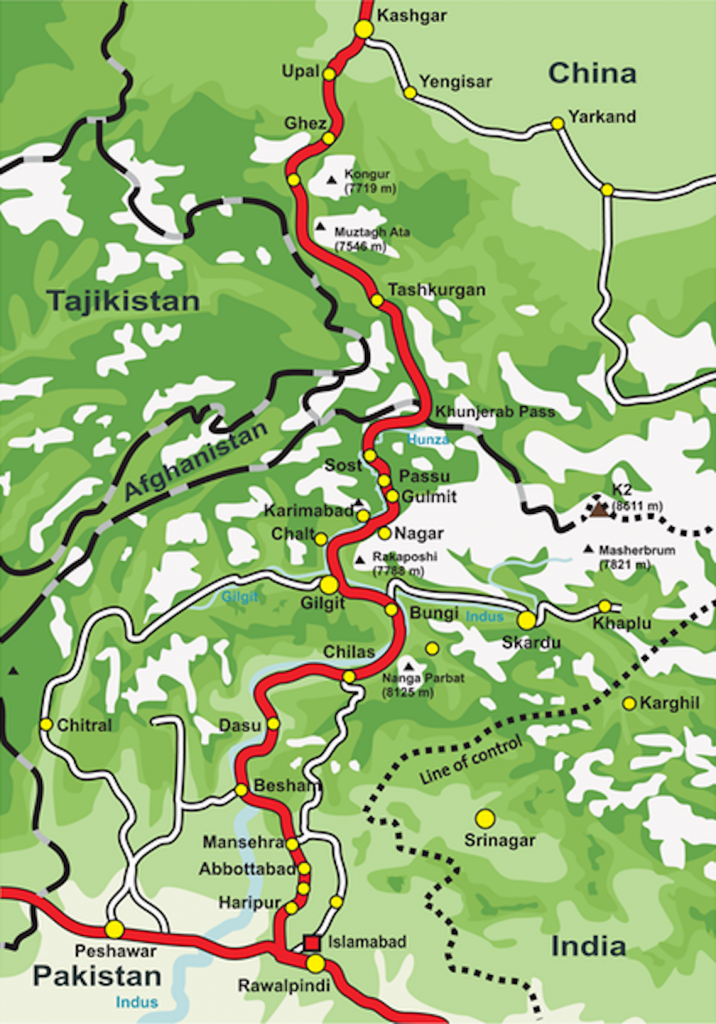
Visa Requirements
It can be difficult gaining a visa for Pakistan. Exceptions have been made, but officially you need to apply for your visa in your home country. A single entry visa for Pakistan costs £104.
The reality is that the visa system, not just for Pakistan, is completely inconsistent, varying from embassy to embassy and member of staff to member of staff. It has even been said to be easier getting a visa from the Pakistan consulate in Bradford than it is the main embassy in London. www.pakmission-uk.gov.pk
SPOT TRACKING DEVICE
My family bought me one for peace of mind, it worked out really well. I sent out a message when I finished moving for the day. It sends the message by preprogrammed SMS, email, Facebook and twitter. After riding in places miles from civilisation and phone reception, I am grateful for it. Unexpectedly, I used it when out and about in towns/taxis at night for personal safety. I once had to threaten to contact police with it in a tricky situation. The only annoyance is sourcing lithium batteries in certain countries for it. Other than that I’ve never had to put it to a real emergency test.
For more information on the Spot device go to www.findmespot.eu
Photos: Fern Hume

